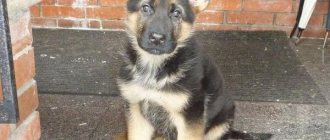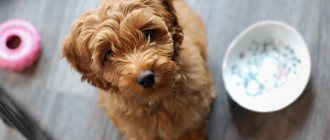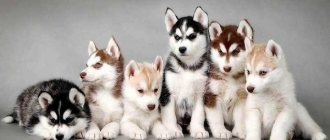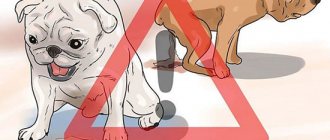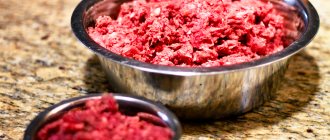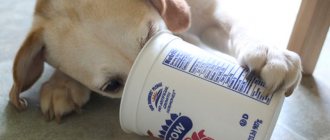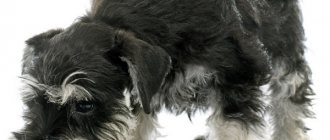Nutritional features of Dalmatians
The first thing you should know is that the idea that all Dalmatians have “protein allergies” is just a myth.
Second: stones in Dalmatians are formed from uric acid. Urea is another substance, it appears as a result of the breakdown of proteins and informs the attentive owner that the amount of protein food should be reduced - there is too much protein in the current diet.
Third, the Dalmatian's diet should contain enough vitamins, fatty acids and minerals while preventing the formation of uric acid.
What to feed your Dalmatian: natural or dry?
Unfortunately, today there is ongoing debate about what is the best way to feed your four-legged friends, and if we talk about a specific breed - Dalmatians, then owners have a choice - prepare food themselves or purchase ready-made dry diets.
No matter how many advocate for “natural” feeding and its benefits, it is difficult to argue, but high-quality food contains the maximum amount of vitamin and mineral supplements. In addition, if a pet, and many smooth-haired dogs suffer from this disease, has a food allergy, then choosing hypoallergenic food is much easier than sorting through foods and watching your pet suffer.
Also, when dry feeding, it is always possible to purchase a diet based on breed, size, age, coat type, and, of course, it is not at all difficult to determine the daily intake. But this all applies to quality brands.
“Naturalka” is a natural food for dogs, and the owner always knows what the dish his pet eats consists of. And if the products are fresh and properly prepared, then why not choose this option. Naturally, in this case it is more difficult to balance food and, at certain points, the pet will need additional sources of nutrients.
It turns out that in any case, food for a Dalmatian should be of high quality.
Be sure to read:
- dry food for large dogs;
- how to switch a dog to dry food.
- super premium dog food.
Switching your dog to natural food
If you are transferring your dog to (the principles of applying this particular nutritional system to Dalmatians are described in the article), first do an ultrasound, urine test and blood biochemistry. You should know what your dog's current health status is. After drawing up a menu and switching from food to natural food, take tests quite often at first to monitor how the body is adapting.
In any case, you need to get tested at least once every 6 months - this is required by the Dalmatians' tendency to urolithiasis.
The Dalmatian is majestic and impressive as long as it is in excellent physical shape and feels good. No breed lover would like the sight of a dog with obesity, dull coat or obvious problems. To properly feed your Dalmatian, you need to know the characteristics of the breed and the nuances concerning its metabolism.
When studying the breed, an unexpected fact was established that the Dalmatian's body (like humans) produces excess uric acid when receiving a large amount of protein. Moreover, the process starts only when there is a glut of plant proteins, that is, proteins contained in cereals and vegetables. This does not mean that Dalmatians can be fed only with products of animal origin; they are necessary, but their selection includes several conditions:
- Absolutely not - semolina, corn grits.
- Not recommended - millet, pearl barley and wheat groats, oat flakes (gives a yellowish coat).
- You can use barley, buckwheat and rice groats, the last two are preferable.
Note!
Pearl barley is introduced into a dog’s diet if they have weight problems. In the case of Dalmatians, you should consult your veterinarian before changing his diet.
Almost all short-haired dogs are prone to dermatitis due to a. For dogs at risk, the same products as for people: chicken eggs, bee products, semi-finished products, industrial dairy products, soy, sausages, meat and fish processed with liquid smoke. Dietary food is selected for dogs with allergies. When an allergen is identified, it is excluded. It happens that the cause of allegri cannot be identified, and then the owner has only one choice - to choose hypoallergenic dry food for the Dalmatian, in accordance with his age and weight.
Important!
Dalmatians are choleric by nature; dogs usually absorb food very quickly, and the owner may doubt whether the portion is of sufficient size? The daily food intake is calculated based on the dog’s needs, and intuitive “supplements” lead to obesity and health problems.
And now you have a little spotted miracle that fills the house with joy. However, we must remember that now you are responsible for his life and health, which means you need to find out what you can and cannot feed your Dalmatian. Today the “Dai Paw” website will consider the topic of feeding a Dalmatian puppy, as well as feeding an adult Dalmatian (both natural food and dry food).
Basics of proper dog nutrition
With dry food everything is quite simple and the main points are described above. Two more advantages are not indicated - saving the owner’s time and the ability to use an automatic feeder. It is worth clarifying a few more nuances about the natural diet:
- The ideal ready-made food is well-cooked porridge, diced meat and grated vegetables. Proportion 33:33:33%. The remaining 1% involves vitamins or other supplements.
- An adult dog eats 1 or 2 times per meal. The daily food intake is divided into the number of meals.
- You need to feed your Dalmatian puppy not only often, but also plentifully. The share of meat and offal is increased to 50%; calcium, feed yeast and vitamin supplements are fed daily.
- Given the tendency to allergies, dairy products are fed with extreme caution and are excluded from the diet of an adult dog (if necessary).
- Before feeding the meat, it must be cut into cubes and doused with boiling water.
- Dried seaweed is very beneficial and is often recommended by veterinarians, but such supplements can affect the color of the coat.
- To improve coat quality and digestion, Dalmatians are given live yogurt, natural kefir or probiotic supplements.
- According to generally accepted rules, the daily calorie intake is calculated based on the age of the puppy or the weight of the adult dog. For an adult Dalmatian, the norm is 69 kcal/kg.
What to feed a Dalmatian puppy
Typically, puppies are purchased from kennels or breeders when they are at least 6 weeks old. Such babies have already passed the phase of feeding on mother's milk and can be given various foods. What to feed a 1.5 month old Dalmatian puppy? - Low-fat cottage cheese, minced meat, various porridges (crushed oatmeal, semolina, rice), boiled vegetables pureed. Also, at this age, the Dalmatian can be given a little raw fresh liver, which is a good source of iron and vitamins). Ready-made food should only be given when heated (to a temperature of about 40 degrees).
When the Dalmatian is 2 months old, you can already give fish (without bones, best in the form of cod or pollock meatballs). After three months, you can add any foods suitable for an adult dog to your puppy’s diet (the list of prohibited foods is written below).
How many times a day should you feed your Dalmatian puppy?
| Puppy age | How many times to feed | Feeding schedule |
| Up to 2 months | 6 times a day | At 7:00, 10:00, 13:00, 16:00, 19:00, 22:00 |
| 2 to 3 months | 5 times a day | At 7:00, 10:00, 14:00, 18:00, 22:00 |
| 3 to 4 months | 4 times a day | At 7:00, 12:00, 17:00, 22:00 |
| 4 to 6 months | 3-4 times a day | At 7:00, 12:00, 17:00, 22:00 |
| From 6 to 10 months | 3 times a day | At 7:00, 13:00, 21:00 |
| From 10 months | 2 times a day | At 7:00, 21:00 |
Please note that it is not necessary to switch your dog to two meals a day. This is done only by those who may be at work from morning to evening and do not have free time to feed their pet during the day.
An adult Dalmatian can be fed many foods, the main thing is not to feed those on the prohibited list. Below we give an example of a diet for an adult dog that is also suitable for a Dalmatian.
Diet for a Dalmatian
- 30-50% meat. Dalmatians can eat lamb, lean beef, rabbit, and horse meat. It is not recommended to give minced meat to an adult dog. By-products (liver, heart, etc.) can also be given. Ideally, a Dalmatian needs 20 grams of meat per kilogram of weight (per day).
- 25-35% cereals. You can have buckwheat, rice. barley, oatmeal, sometimes peas (but in small quantities). The cereal is prepared like regular porridge; you can add boiled vegetables or meat to it (added at the end of cooking).
- 20-30% dairy products. You can have cottage cheese, kefir, yogurt, yogurt. It is not recommended to give fresh milk to an adult Dalmatian.
- 15-20% vegetables. Carrots, pumpkin, cucumbers, beets, zucchini, bell peppers, white cabbage - all this is well absorbed by the dog’s body. Vegetables are a source of many vitamins.
- Fish . From time to time, instead of meat, your Dalmatian can be given fish. At the same time, sea fish can be given raw (or preferably frozen), and river fish must be boiled or frozen. The bones should be pulled out.
- Fruits . Many Dalmatians love various fruits, and you can give them to your pet as treats.
Dogs should not be given sweets at all. Photo by Leo Hidalgo.
The foods listed below should not be fed not only to Dalmatians, but also to dogs of any other breed.
- Potatoes (very poorly absorbed by the dog’s body).
- Sweets (chocolate, cookies, candies, etc.).
- Flour product (noodles, etc.).
- Marinated, salted and smoked products.
- Hard and tubular bones;
- Sausages and salami.
- Fried beef and pork should not be given.
- Anything that contains spices, ketchup or mayonnaise.
Dry food for Dalmatians
If you want to feed your pet with ready-made food, then be sure to read our article about, from which it will become clear why many vaunted brands are actually bad. Here we will simply note that the good ones include the super premium class and holistic ones.
One of the most striking and famous dog breeds is the Dalmatian.
It has such a unique color that it is impossible to confuse it with other representatives.
What to feed your Dalmatian
An adult Dalmatian can be fed many foods, the main thing is not to feed those on the prohibited list. Below we give an example of a diet for an adult dog that is also suitable for a Dalmatian.
Diet for a Dalmatian
- 30-50% meat. Dalmatians can eat lamb, lean beef, rabbit, and horse meat. It is not recommended to give minced meat to an adult dog. By-products (liver, heart, etc.) can also be given. Ideally, a Dalmatian needs 20 grams of meat per kilogram of weight (per day).
- 25-35% coarse. You can have buckwheat, rice. barley, oatmeal, sometimes peas (but in small quantities). The cereal is prepared like regular porridge; you can add boiled vegetables or meat to it (added at the end of cooking).
- 20-30% dairy products. You can have cottage cheese, kefir, yogurt, yogurt. It is not recommended to give fresh milk to an adult Dalmatian.
- 15-20% vegetables. Carrots, pumpkin, cucumbers, beets, zucchini, bell peppers, white cabbage - all this is well absorbed by the dog’s body. Vegetables are a source of many vitamins.
- Fish. From time to time, instead of meat, your Dalmatian can be given fish. At the same time, sea fish can be given raw (or preferably frozen), and river fish must be boiled or frozen. The bones should be pulled out.
- Fruits. Many Dalmatians love various fruits, and you can give them to your pet as treats.
Dogs should not be given sweets at all. Photo by Leo Hidalgo.
Features of Dalmatian keeping
The Dalmatian is a strong and fairly large animal with excessive energy. This friendly and brave pet, endowed with enormous willpower,
Most suitable for a person who has certain skills in preparing such animals.
Dalmatians love children. Dogs have a cheerful and vindictive character at the same time; familiarity with them should not be allowed. Although they often show their temper, they still obey an attentive and intelligent owner. A strong feature of this breed is the desire to accompany the owner everywhere. The Dalmatian is an active and sociable dog that can serve as a guard dog.
A minor drawback is that the dog remembers its offenders.
Important!
If the owner communicates with the Dalmatian for a short time, then at first the animal is able to understand this. However, if this happens constantly, the dog’s character will become worse, irritability and withdrawal will appear.
If he is kept tied up on a chain, he can become aggressive, uncontrollable and embittered.
This short-haired breed is not suited to living outside all year round - it is cold there in winter.
Warm overalls are required for winter walks.
For normal functioning, such dogs require movement, walks and physical activity.
Care and nutrition
Dalmatians are a very clean breed; they will never get into the mud. But, like any other animal, a dog needs good care. Let's take a look at a few rules:
- Grooming involves combing the undercoat. The Dalmatian sheds annually, so this procedure should be regular, preferably daily. This will give a healthy shine and reduce hair loss.
- The washing up. You need to bathe your pet as needed, but once every six months is acceptable. After the procedure, do not let the dog go outside until it is completely dry.
- It is advisable to clean your ears with a dry cotton swab or disk. Be sure to monitor the level of contamination. Excessive plaque can have a negative impact on a student’s hearing.
- Claw care. Dalmatians have neatly shaped paws that are slightly reminiscent of a cat's. If you do not take care of the length of your dog's nails, he will feel discomfort when walking and running.
- Teeth and gums. If your dog's diet consists of wet food, then you need to brush your teeth once a week with a special tooth powder. When eating dry food, the oral cavity is cleaned automatically when the dry granules are chewed.
It is important to remember that all procedures begin from an early age, even when the Dalmatian is a puppy.
To ensure that your pet grows up healthy and full of energy, it is extremely important to provide him with the right diet.
From natural food, Dalmatians can eat:
- buckwheat and rice;
- meat, preferably lean, for example rabbit, beef, turkey;
- sea fish without large bones;
- vegetables;
- low-fat cottage cheese.
You can periodically feed your pet raw bones. Cooking them is strictly prohibited, as they can clog the intestines. In addition to cottage cheese, you can add kefir to your diet. Dalmatians also enjoy eating apples and citrus fruits; periodically pamper your pupils with such delicacies.
If we are talking about dry food, then only premium quality. This food is rich in beneficial minerals and does not contain harmful substances.
It is very important that Dalmatian puppies eat regularly. Due to the high growth rate, the puppy must receive enough food. The mandatory diet includes meat, porridge, fish and cottage cheese.
How often do you feed:
- 1.5-3 months – 5 times/day;
- 3-5 months – 4 times/day;
- 5-10 months – 3 times/day;
- 10 months and older – 2 times/day.
Dalmatians are not picky eaters. But diet changes should be made gradually. Also, do not add salt to food; cottage cheese is enough for pets.
It is better to feed your pet after a walk. This makes food easier to digest.
Care
Caring for a Dalmatian is not difficult. To remove dead hair, it is advisable to comb it daily. This breed is distinguished by its cleanliness.
Therefore, there is no need to bathe him often; once a year is enough.
There is almost no smell coming from them.
It is imperative to trim the nails, because very long ones do not allow the paws to shrink. It is necessary to regularly inspect drooping ears, which need to be cleaned of accumulated dirt and wax.
using a cotton swab dipped in an antiseptic solution or water.
Advice!
When feeding your dog natural food, it is necessary to remove plaque from the teeth with a special brush and product. If a dog eats dry food, then the teeth clean themselves while eating these granules. Dalmatians must be provided with proper nutrition.
Feeding Dalmatians with natural food
Dalmatians should be given raw meat, scalded with boiling water. It is cut into pieces. Best absorbed:
For cereals, it is better to give this breed buckwheat or rice, cooked in water rather than in meat broth. They will also benefit from raw or boiled vegetables with sunflower oil, sea fish, cottage cheese and other fermented milk products, sometimes boiled eggs and cheese.
You will also need special vitamins and mineral supplements. However, many Dalmatians are very picky or do not respond well to natural food. Therefore, it is easier to use dry food for them.
Feeding your Dalmatian dry food
Since Dalmatians are often prone to allergic reactions to low-quality food products, as well as food additives and dyes. Therefore, it is better not to give them cheap, untested food. Breeders prefer dry food of at least premium, as well as super-premium class from such well-known manufacturers as:
They contain high quality foods, including real meat, and minimal grains, purines, soy and preservatives. At the same time, veterinarians do not advise choosing food from the series “for active dogs.” Yes, the Dalmatian is a very energetic dog, but this food always contains a high amount of protein, which is unacceptable for this dog’s body.
The most suitable foods for Dalmatians are super-premium foods such as Jams, Eukanuba, Hill`s. From these you need to choose a line of food for medium breed dogs. You can add kefir or sunflower oil to your Dalmatians' food, which significantly improves their coat. Sometimes you can give vegetable salads with apples, sweet peppers, and carrots.
Did you like it? Share with your friends!
Give it a like! Write comments!
What is it sick with?
The most sensitive areas and organs of Dalmatians include the kidneys and skin.
They often develop urolithiasis.
The first symptoms are pain in the lumbar region; the dog experiences difficulty when he wants to lie down or stand up, or when jumping. Kidney problems are reflected in the skin, which becomes bronze.
In this case, abscesses, bald patches, and allergic reactions appear on it.
In 12% of cases, dogs of this breed are born deaf. Dalmatians may suffer from:
- hip dysplasia;
- gastric volvulus;
- glaucoma and progressive retinal atrophy.
Dalmatian birth
How long the birth will last is influenced by the number of puppies and the intervals between their births, generally it ranges from 10 minutes to half an hour
. By the time labor is completed, the pause between appearances increases to 1.5–2 hours.
The kitten is born in a bubble, feet first or head first, back up.
As a rule, the placenta comes out with the puppy or during the next contraction.
The bitch needs the owner's help if the puppy has difficulty getting out.
When part of it has already appeared, you need to take it with a napkin and carefully pull it out.
Important!
Newborns cannot be separated from their mother; you just need to keep an eye on them so that she does not crush them during childbirth. If the bitch is nervous, then it is advisable to place the born puppies in a box with a heating pad. They should not be taken away - the mother must see them.
What to feed your Dalmatian?
Taking into account their usual lifestyle, the amount of free time and financial capabilities, each owner decides independently what to feed the dog.
Recently, the BARF (abbreviation for “bones and raw food”) dog feeding system has been gaining momentum, the essence of which is? feeding the animal only natural products (mainly raw bones, cartilage, vegetables and cereals). Its author? veterinarian from Australia Ian Billinghurst. Opponents of this feeding principle note that this system is dangerous for dogs and feeding natural raw foods is not always beneficial.
In any case, you should not experiment on your pet; it is better to trust the many years of experience of dog owners and opt for a traditional diet, be it ready-made food or homemade food.
Puppies
At 2–2.5 months, Dalmatian puppies become independent and independent of their mother.
At this time, their character is already visible.
A kitten that bullies other puppies will turn into a self-confident dog. An owner with a strong character will be able to raise him correctly.
Sloths and food lovers will be the same for adults.
The skin seems too big for a Dalmatian puppy because it bunches up. In healthy kittens, the fur is smooth, shiny and has no bald spots.
The breed is distinguished by:
- flat back;
- high-set and tightly pressed ears;
- saber-shaped tail, not rising high from the back.
Babies have dark blue eyes, which turn brown after 2 months. Having blue eyes is considered a defect.
Little Dalmatians need to buy toys for them to carry and chew on.
It is best if they are made from natural materials. Size also matters; don't give them ones that they could swallow or choke on
.
How many puppies are born?
The day of mating affects the fertility of dogs.
To get a lot of fruits, you need to knit with the maximum number of ripe eggs.
Their quantity and quality are ensured by:
- health of the bitch;
- diet;
- hormonal levels;
- conditions of detention.
If an animal is overfed or, conversely, exhausted, then it will not bear offspring at all,
or there will be few puppies. The number of cubs is directly influenced by the male dog, namely:
- age;
- breeding frequency;
- feeding ration.
If a male dog is more than 10 years old or if he is bred more than 2 times a month, there are very few sperm. And those weak ones, not all of them cope with their task.
What do newborn kittens look like?
Reference.
Dalmatian puppies are born snow-white.
Pigment spots begin to appear by the second week.
The purity of the blood is indicated by their location and intensity. The body has no signs of asymmetry, the spots are clear.
Description by month
The weight of a newborn Dalmatian ranges from 350 to 450 grams.
In 1 month it becomes 10 times heavier.
Due to their active nature, babies eat 3 times more food than adult dogs. It is imperative to ensure that there is no overeating.
At 2 months their weight should reach 7–9 kg.
The three-month-old puppy continues to gain weight, which at this age reaches 11 kg.
The height at the withers is between 44–48 cm. At this age, the puppy should be fed no more than 4 times a day.
A 4 month old Dalmatian weighs approximately 15 kg.
His body begins to lengthen. The height is already 48–50 cm.
Upon reaching the age of 5 months, the puppy begins to grow and gain less weight, which by this time is 15–17 kg. It also becomes noticeable how the chest is formed and muscle muscles grow. The height at the withers ranges from 52 to 56 cm.
From this age, the dog should eat 3 times a day.
By 6 months, the dog increases in width and length.
With a height of 54–58 cm, he weighs 16–18 kg.
At the age of seven months, the final formation of the physique is completed and its main growth stops. In proportions he becomes similar to an adult Dalmatian.
The height at the withers reaches 58–60 cm, weight approximately 19 kg. At 9 months he has the proportions of an adult dog. Muscle mass is still being formed. Height is 57–60 cm, and weight reaches 20–22 kg.
When the puppy turns 10 months old, he is transferred to an adult feeding regime - no more than 2 times a day.
If the Dalmatian is healthy, then its weight will be in the range of 23–24 kg, height 58–62 cm. At one year, a dog of this breed already has the parameters of an adult representative, although it requires additional care, since its muscles are still developing. If the owner provides his pet with proper care, then its weight is from 25 to 28 kg, height at the withers is 58–62 cm.
Dogs of this breed are formed before they reach the age of 1.5–2 years.
If the owner takes care of his pet with love and follows all the rules, then the kitten will turn into a tall, muscular, handsome and big handsome guy.
Feeding Dalmatians with natural products
The Dalmatian's diet must include the following products:
Meat
Preference should be given to poultry, beef, lamb, and rabbit. The optimal amount of fresh meat per day is 250-300 grams. It is better to limit pork as it is too heavy for a dog. You should not give minced meat - it is poorly digestible. Boiled or raw (previously scalded with boiling water) meat is cut into pieces. Liver, udder, and tripe are suitable offal products for Dalmatians. In small quantities, bones from the veins and raw cartilage bones are useful for the dog.
Fish
For dogs older than 3 months, it is good to include sea fish in their diet. This is an excellent source of vitamins and microelements. Large bones should first be removed from it, cut into pieces and thermally treated. A serving of fish should be approximately one and a half to two times larger than a serving of meat.
Eggs
It is useful to give your Dalmatian bird eggs in the amount of 2-3 pieces per week (boiled or in the form of an omelet).
Cereals
An excellent source of carbohydrates is cereal. Buckwheat and rice are ideal for this breed. Cereals are cooked in water or meat broth. The dog should not be given oatmeal (the coat becomes dull), corn, pearl barley and wheat groats. It is allowed to include white bread in the diet (it is better if it is a little stale), dried bread, and unsweetened pastries.
Dairy
Of the dairy products, cottage cheese is the most preferred; it is an excellent food product for both puppies and adult dogs. Cottage cheese is easy to make yourself. Add a liter of kefir to 1 liter of milk, leave for a while, then heat, drain in a colander or cheesecloth to drain the whey. You can also offer your Dalmatian yogurt, kefir, fermented baked milk, yogurt or young cheese.
Vegetable and animal fats
It is recommended to add vegetable oil to Dalmatian food: olive, flaxseed or peanut, as well as fish oil. This will significantly improve the quality of the animal's fur. Vegetable and animal fats contain many beneficial substances for dogs.
Vegetables and fruits
Vegetables are an integral part of the Dalmatian diet.
They can be given boiled, stewed or raw, after being chopped on a vegetable grater. Your pet will be very happy to eat vegetable salads with vegetable oil or sour cream. Cabbage, beets, carrots, pumpkin, zucchini are useful. Vegetables can be stewed with meat or cereal. Dalmatians are very fond of fruits and berries. If your dog does not have food allergies, feel free to treat him to fresh apples, pears, tangerines, and oranges. Fruits will perfectly compensate for the lack of essential vitamins and microelements.
To prevent plaque, you should give your pet fresh tomato or unsalted tomato juice.
Water
Your Dalmatian should always have fresh water in his bowl, which should be changed at least 2 times a day. When feeding Dalmatians with natural products, part of the liquid comes from the food, and if, when switching to natural food, the dog begins to drink less water, there is no need to worry.
What to feed?
For normal growth, Dalmatians must eat properly. You need to choose natural, balanced food or special premium food for puppies.
A balanced diet is a comprehensive menu consisting exclusively of healthy foods.
If you give your puppy both at once, he will get an upset stomach.
The diet must include:
- boiled fish fillet and tender meat;
- fruits and vegetables;
- porridge;
- 2 eggs per week;
- cottage cheese;
- greenery.
Advice!
Food must be complete and sufficient. If the puppy still asks to eat after eating, you need to increase the portion, and when there is food left in the bowl, then reduce it.
What not to feed a Dalmatian
The foods listed below should not be fed not only to Dalmatians, but also to dogs of any other breed.
- Potatoes (very poorly absorbed by the dog’s body).
- Sweets (chocolate, cookies, candies, etc.).
- Flour product (noodles, etc.).
- Marinated, salted and smoked products.
- Hard and tubular bones;
- Sausages and salami.
- Fried beef and pork should not be given.
- Anything that contains spices, ketchup or mayonnaise.
Raising a dog
It is important to begin education from the first days of life so that the kitten understands that the boss in the house is the owner.
Otherwise the dog will grow up uncontrollable. She needs to explain what is not allowed:
- bite;
- climb into bed;
- chew shoes;
- beg for food from the table.
In upbringing, the owner must be persistent, patient and confident. Dalmatians are emotional and extremely sensitive dogs, so you should not be rude to them. It is forbidden to hit the puppy, shout at him for his offense and disobedience, you can pat him by the withers or simply scold him. Punish only if he is directly caught on the spot.
Important!
It is impossible to ignore the puppy’s failure to comply with the owner’s commands. Obedience and correct behavior should be rewarded with stroking or a treat, but the animal should not be treated too gently.
Dalmatians easily master commands such as “No!”, “Come to me!”, “Place!”.
However, he quickly gets bored with monotonous activities, so after a short period of time you need to start teaching him more complex commands.
Nicknames for Dalmatians
Some representatives of this unique dog breed exhibit noticeable personality traits combined with high mental abilities.
Such rare nicknames as Vanilla, Friendship, Ibiza, Blizzard, Prelest, Zhador, Fifa, Rocket, Cinzano are suitable for these Dalmatians.
The unique eye-catching coloration of Dalmatians in the form of bright black spots on a snow-white background creates clever combinations. Thanks to this unique feature, the following nicknames are appropriate: Aesthete, Handsome, White, Harlequin, Pattern, Jade, Jacquard, Star.
Previously, this breed of dogs was specially bred to accompany carriages and run in front of them, thereby clearing the road. Animals of this breed have qualities such as incredible mobility and energy.
Therefore, the nicknames are perfect for them: Rebel, Vanguard, Wind, Vassal, Jacques, Zero, Kois, Alarm, Olympus, Prince, Ron, Faust, Tito, Eden, Yarvi.
Dalmatian girls are distinguished by their cheerfulness and mobility.
They must communicate with humans. They can be given nicknames such as: Adele, Bertha, Gladys, Greta, Kaira, Leia, Olympia, Tiffany, Uslada, Juno.

